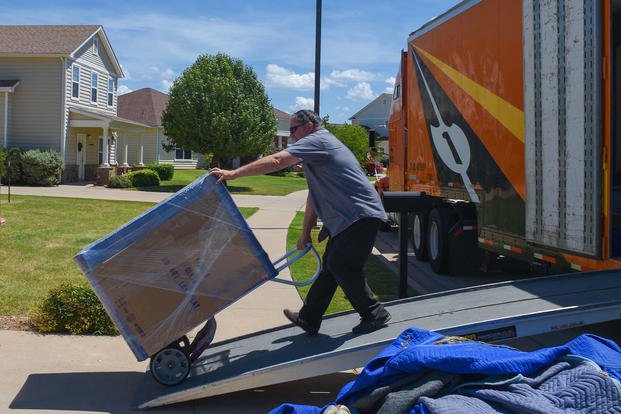Officials who oversee the Pentagon's vast household goods moving system said they are rolling out a series of system changes and upgrades after a rash of complaints regarding lost and broken household goods over the summer’s peak moving season gained national attention.
Those problems sparked interest from lawmakers and the Pentagon's service chiefs after a Change.org petition started by a military spouse gained over 102,000 signatures.
Now officials at U.S. Transportation Command (TRANSCOM), headquartered at Scott Air Force Base, Illinois, said they are putting in place a series of shifts within their own structure to work towards a smoother moving process for military members, while asking the military services to make other changes.
"We recognize the importance of ensuring military families have a positive move experience when they're relocating," Rear Adm. Peter Clark, who directs strategy, capabilities, policy and logistics for TRANSCOM, told Military.com. "If nothing else, the visibility of the challenges of this year has really helped align a lot of forces towards making things better. So there is a strong commitment throughout the Department of Defense, the services, TRANSCOM and even Congress to make a difference."
First among the upgrades, Clark said, are changes TRANSCOM officials can make within their own structure.
A change to the Defense Travel Regulation that TRANSCOM helps oversee requires more quality assurance inspectors at base personal property offices. Clark said their goal is to have enough inspectors to conduct visits to half of the homes where pack-outs are taking place on any given day.
And starting in nationwide is December, all troops and families will have the option of watching their household goods get packed into sealed crates at their home for all moves except those with confirmed door-to-door delivery arrangements, Clark said. Currently, only moves outside the continental United States or those with goods going into long-term storage include that option.
"It does cost a little more, but I am long past worrying about a few more pennies," Clark said. "This is about providing a better relocation experience for the families."
TRANSCOM is also working to replace the legacy Defense Personal Property System with a more user-friendly version that will make booking a move and filing claims easier, he said. That system should be available to some users over the summer of 2019.
Many of this year's specific challenges, Clark said, stem from a national truck driver shortage and the improving economy. Companies have had trouble staffing experienced packers, movers and drivers, he noted. That issue, paired with a high demand for moves over the 14 weeks of summer -- 42 percent of all military moves take place in the summer months -- puts unsustainable pressure on the system, he said.
And that's why the change that will have the most impact on whether or not each family has a positive moving experience -- spreading moves out throughout the year -- must come from the military services. TRANSCOM has no final say on when troops get their orders or the services' manning cycles.
"We're working with the service to level-load the demand as much as possible," he said.
But even facets of TRANSCOM's in-house changes are up to the services to implement, he said. For example, while TRANSCOM has spelled out quality assurance inspector staffing levels in the travel regulation, it's up to the services to fund those positions. And Clark said he would like to see bases hire military spouses as seasonal quality inspector employees, something Scott Air Force Base is working with TRANSCOM to test out. But ultimately making it happen isn't up to him.
"I would love for the services to offer seasonal employment to spouses, because they'll be the biggest advocates and most demanding quality assurance advocates you can possibly imagine, and we know that spouses like to look after and take care of each other," he said. "I see this as a great possibility, we just need to get it off the ground."
DoD has also put together an advisory team of service representatives, TRANSCOM officials, service members and military spouses to weigh in on changes, Clark said. They are scheduled to begin meeting late this month.
In the meantime, Clark said he is hoping to help military families better understand their rights when they move, and the services and protections offered to them when a move goes poorly.
He said Move.mil, the DoD's military move education portal, is packed with information that can help families move smoothly. And the post-move survey troops are sent after their move, which currently only 30 percent of moving families take, can help gives officials a snapshot of whether or not families are having a good moving experience.
-- Amy Bushatz can be reached at amy.bushatz@military.com.
This article was updated Oct. 16 to reflect TRANSCOM's role in development of the Defense Travel Regulation and the name of TRANSCOM's legacy system.













